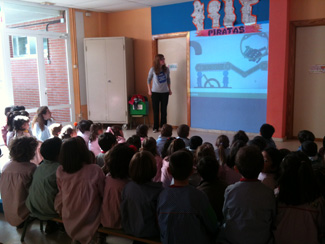consent_cookie
Duración: 1 year
Stores the user's cookie consent state
We use our own and third-party cookies to analyze web traffic. If you want to see the videos on the web, please accept the Marketing Cookies.
If you have any questions or want to modify your consent to the use of all of them at any time, you can do so through the "Cookies Policy" menu, located at the bottom of the website. Thank you very much.
A "Cookie" is a small file that is stored on the user's computer in which information is recorded for various purposes.
The information provided below will help you understand the different types of cookies:
Depending on the length of time they remain activated in the terminal equipment we can distinguish:
Session cookies: are those designed to collect and store data while the user accesses a web page. are usually used to store information only interested in conserving for the provision of the service requested by the user in a single occasion (for example, a list of products acquired) and disappear at the end of the session.
Persistent Cookies: are those in which the data is still stored in the terminal and can be accessed and treated for a period defined by the responsible for the cookie, and that can range from a few minutes to several years.
Depending on who is the entity that manages the computer or domain from which the cookies and treat the data obtained, we can distinguish:
Own cookies: are those that are sent to the user's terminal equipment from a computer or domain managed by the user publisher and from which the service is provided requested by the user.
Third-party cookies: are those that are sent to the user's terminal equipment from a computer or domain that is not managed by the publisher, but by another entity dealing the data obtained through cookies.
There are many purposes for using the cookies. Depending on the purpose for which they are processed the data obtained through cookies, Some of the purposes can be:
Technical cookies, preference cookies or personalization, analysis or measurement cookies, behavioral advertising cookies.
Complementary guarantees - Cookie management:
As a complementary guarantee to those described above, the registration of cookies may be subject to acceptance during the installation or updating of the browser used. This acceptance can be revoked at any time using the available content and privacy configuration options.
Many browsers allow you to activate a private mode by which cookies are always deleted after your visit. Depending on each browser, this private mode may have different names. Below is a list of the most common browsers and the different names given to this "private mode":
Internet Explorer 8 and higher; InPrivate Safari 2 and higher; Private Browsing Opera 10.5and higher;Private Browsing FireFox 3.5 and higher Private Browsing Google Chrome 10 and higher; Incognito Important: : Please read the help section of your browser carefully to learn more about enabling "private mode". You may continue to visit our website despite having this "private mode" activated, salthough browsing the website may not be optimal and some utilities may not work properly.
29-03-2012
Humana took yesterday March 28th in a series of workshops on recycling sponsored by the Department of Environment of the Municipality of Collado Villalba (Madrid) in order to sensitize the school population about the importance of this concept. In total, five workshops on a total of 305 children aged 3 to 12 years and 15 teachers from the CEIP Daniel Vazquez Diaz. Together with the Foundation participated in the cycle Ecoembes, which focused on the recycling of packaging and Gave Vegetable Oil Management. Humana participation is part of the area of ??Education for Development Foundation.
The textile recycling helps protect the environment by reducing in part the volume of waste generated by citizens, giving a second life to clothing that would otherwise go to landfill. With the reuse of clothing and footwear is achieved, also reduce the consumption of natural resources such as water or fossil fuels, as well as fertilizers and pesticides used in the manufacture of textiles. In addition, reusing or recycling textiles reduces CO2 emissions.
